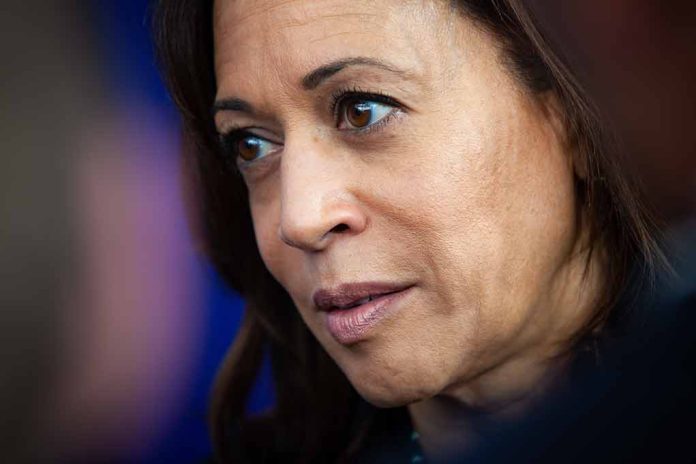
Vice President Kamala Harris’s silence on reparations for African Americans has sparked significant backlash across political lines.
At a Glance
- Harris’s past support for reparations viewed as contradictory to her silence.
- Public demands transparency on historical issues like reparations.
- Support for measures addressing systemic racial inequalities remains critical.
- Calls for careful examination and studied responses to reparations.
Harris’s Explicit Support vs. Current Silence
Vice President Kamala Harris has been notably silent on providing a definitive stance on reparations for African Americans, despite her historical support for the cause. This silence has been met with backlash, leading to questions about her commitment to social justice efforts. Critics argue that clear communication on such matters is crucial for leaders.
Harris has previously supported the commission to study reparations, emphasized the importance of addressing historical and ongoing racial harm, and proposed various initiatives aimed at addressing economic disparities. This includes advocating for mental health treatment as a form of reparations.
KAMALA HARRIS NOT FOR REPARATIONS
US President Joe Biden appears to have heeded calls from fellow Democratic Party members to withdraw from the 2024 US presidential race, ending his re-election bid on 21 July.
This follows his debate performance on 27 June, which fuelled some… pic.twitter.com/eJCTd2Uxjk
— African Stream (@african_stream) July 22, 2024
Public’s Demand for Transparency
The public’s response to Harris’s silence underscores the broader expectation for transparency and clarity from government officials. Particularly when it comes to policies that address long-standing racial disparities, ambiguity is often perceived as a lack of commitment to resolving critical issues.
“I think there has to be some form of reparations and we could discuss what that is, but look, we’re looking at more than 200 years of slavery,” she said. “We’re looking at almost 100 years of Jim Crow. We’re looking at legalized segregation and in fact segregation on so many levels that exist today based on race and there has not been any kind of intervention done understanding the harm and the damage that occurred to correct [the] course. And so we are seeing the effects of all those years play out still today.”
Despite the need for comprehensive study and dialogue, Harris’s non-response to recent calls for clarity has left both supporters and critics questioning her stance. The issue of reparations involves examining historical injustices and proposing targeted interventions, making transparency from political leaders indispensable.
Reparations and Systemic Inequality
Harris has highlighted the complexity of reparation in the past, noting that simply writing a check would not address deeper systemic issues. Her proposals have included investments in mental health, housing, education, and criminal justice reforms targeted at historically marginalized communities.
“You can look at the issue of untreated and undiagnosed trauma. African-Americans have higher rates of heart disease and high blood pressure. It is environmental. It is centuries of slavery, which was a form of violence where women were raped, where children were taken from their parents – violence associated with slavery. And that never – there was never any real intervention to break up what had been generations of people experiencing the highest forms of trauma. And trauma, undiagnosed and untreated, leads to physiological outcomes.” – Kamala Harris
The House proposal known as H.R. 40, which Harris has endorsed, aims to establish a commission to study reparations and propose appropriate measures. However, the bill faces significant opposition in Congress, making the need for vocal support from leaders even more critical.
Sources:
- Advocates hope Harris will boost momentum on reparations to Black Americans
- What Kamala Harris Has Said About Reparations for Black People
- Sen. Kamala Harris On Reparations
- Reparations bill tests Biden and Harris on racial justice
- Kamala Harris on reparations for slavery: ‘It can’t just be, ‘Hey … write some checks’
- Sen. Kamala Harris gets backlash over question about reparations for African-Americans
- 2020 Democrats are trying to redefine the idea of reparations
- Democrats and slavery reparations: where do 2020 candidates stand?
- Reparations Are a Financial Quandary. For Democrats, They’re a Political One, Too.















